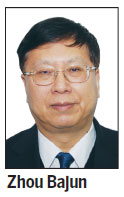Failures of Western democracy offer lessons for Hong Kong
Updated: 2014-03-26 08:25
By Zhou Bajun(HK Edition)
|
|||||||
Some Hongkongers have fallen for the idea of Western democracy hook, line and sinker. But, in the West, voices questioning democracy are rising in volume every day. Since the current global financial crisis began in September 2008, a new term - "The West's political paralysis" - has appeared in Western magazines, newspapers as well as online forums. The Economist is one of the leading publications scrutinizing Western democracy and realizing it is dysfunctional and the contagion is spreading around the Pacific Ocean as well as across the Atlantic. In its No 8744, Volume 400, July 30-August 5, 2011, The Economist said in an editorial: "Even if the current crises abate or are averted, the real danger persists: that the West's political system cannot take the difficult decisions needed to recover from a crisis and prosper in the years ahead." It also says, "The years of political paralysis have done Japan more harm than the economic excesses of the 1980s." Recently, it published a six-page essay: "What's gone wrong with democracy" in its No 8876, Volume 410, March 1-7, 2014, offering an in depth look at the evolution of Western democracy. The essay points out: "Democracy's global advance has come to a halt, and may even have gone into reverse."
The United States has been a model as well as a beacon of democracy for more than two centuries. In the last century, Americans believed their country had created a liberal international order. This was enforced by mighty fleets roaming the seas, armies stationed around the world and the diplomatic skill to spread democracy worldwide. But, at the turn of this century, the US political system became so dysfunctional it could not remedy its declining role in global affairs. Therefore, as commentator David Brooks said in "The Leaderless Doctrine" in The New York Times on March 10: "For the first time in recorded history, a majority of Americans believe their country has a declining influence on what's happening around the globe." Brooks adds that Americans "have lost faith in the idea that American political and military institutions can do much to shape the world."

While democracy revealed fundamental weakness in the West's political systems, not much has been done to reverse the corrupting spread of a sick Western ideology. Much to the despair of Western zealots, the rise of China presented the world with a refreshing idea - aptly labeled the "China Model". This is profoundly different from what the West promised with its brand of democracy. China has successfully overturned the traditional thinking of Western democracies. It has done this by shattering a number of records in economic development, proving that its government is more efficient and less susceptible to gridlock than Western democracy. A Chinese proverb says: "The person who wears the shoes knows whether they fit first hand". It is worth noting that the 2013 Pew Survey of Global Attitudes indicated that 85 percent of Chinese were "very satisfied" with their country's direction, compared with 31 percent of Americans.
Ironically, an international city like Hong Kong is yet to wake up and realize that Western democracy is in a crisis of its own making. Some Hongkongers still blindly worship Western democracy and remain opposed to the mainland's political system. They hope the mainland's system may someday be remolded to match the Western model. The opposition camp is so completely sold on this fantasy it is still trying to turn the city from a special administrative region into an independent political entity - at the whim of some Western powers determined to topple the central government.
Hongkongers should realize Western democracy is now suffering serious structural problems; essentially it has turned into "majoritarianism". This means that to obtain power, all political parties must vie for votes. Therefore, in many countries, democracy has given rise to structural fiscal deficits in order to satisfy voters' demands - especially endless increases in social welfare. The Western bipartisan or multi-partisan system has descended into "vetocracy".
Hongkongers also should realize that a blind switch to Western democracy has caused a number of former Soviet republics to suffer all kinds of trouble. This includes economic stagnation and social unrest - with no end in sight. Some other countries in the region are unfortunately in a similar situation. Some of these are too close to us geographically for comfort. Hong Kong simply cannot ignore the disastrous situations these countries are now facing - thanks to Western democracy.
Hongkongers should know, too, that the "One Country, Two Systems" principle is an unprecedented experiment not just for China - but for humanity. No sovereign country anywhere should be forced to copy the West in the name of democracy - let alone Hong Kong, a special administrative region of China - period.
The West is struggling to find a way out of a mess for which democracy has yet to prove to be the cure. Here in Hong Kong, we have to put the current public consultation on constitutional development back on the right track. That is in accordance with the Basic Law and relevant decisions by the Standing Committee of the National People's Congress (NPCSC). Only by doing this can the city achieve universal suffrage. When Hong Kong residents realize that not even most Western nations fully subscribe to the kind of democracy people are advocating here, then the SAR will be truly back in the bosom of the motherland.
The author is a veteran current affairs commentator.
(HK Edition 03/26/2014 page9)